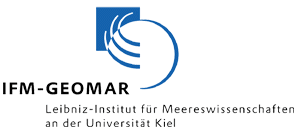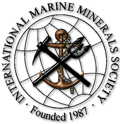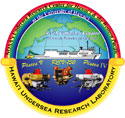2006 Conference: Sponsors
 The Leibniz Institute of Marine Sciences at Kiel University (IFM-GEOMAR) was founded in January 2004 by
the fusion of the Institut für Meereskunde (IfM) and the Research Center for Marine Geosciences (GEOMAR). The institute is aimed
toward the interdisciplinary investigation of all relevant aspects of modern marine sciences, from sea floor geology to marine meteorology. Research is conducted throughout the world in all oceans. The institute focuses on four major research divisions: ocean circulation and climate dynamics, marine biogeochemistry, marine ecology, and the dynamics of the sea floor.
The Leibniz Institute of Marine Sciences at Kiel University (IFM-GEOMAR) was founded in January 2004 by
the fusion of the Institut für Meereskunde (IfM) and the Research Center for Marine Geosciences (GEOMAR). The institute is aimed
toward the interdisciplinary investigation of all relevant aspects of modern marine sciences, from sea floor geology to marine meteorology. Research is conducted throughout the world in all oceans. The institute focuses on four major research divisions: ocean circulation and climate dynamics, marine biogeochemistry, marine ecology, and the dynamics of the sea floor.
There are two major, interdisciplinary research projects at the Leibniz Institute. SFB 574 addresses the impact of subduction on the development of the Earth´s climate, geochemical evolution of the hydrosphere and atmosphere, and the causes of natural disasters. SFB 460 investigates fluctuations of water mass formation and transport processes in the subpolar North Atlantic, in order to gain a better understanding of their significance for the dynamics of thermohaline overturning and oceanic uptake of anthropogenic CO2. With annual funding from state and federal governments and research grants, four research vessels, several major laboratories, and an attractive aquarium, the Leibniz Institute of Marine Sciences belongs in the top league of oceanographic institutions worldwide.
The UMI gratefully acknowledges Director and Prof. Dr. Peter M. Herzig and Dr. rer. nat. Sven Petersen and the staff of IFM-GEOMAR for their gracious and generous support of the UMI.
 Neptune Minerals plc
is a leading explorer and developer of Seafloor Massive Sulphides (SMS),
a new class of high-grade base and precious metal deposits. Listed on the AIM market in London, (NPM.L) Neptune holds 3 exploration
licenses, which gives the Company exclusive exploration rights over 35,000 square kilometers of New Zealand controlled waters—helping
Neptune secure a pre-eminent position in mineral rights over known SMS deposits in the region. Following its listing in October 2005,
the Company completed the operational phase of its exploration program in December 2005. The program focused on coring and seafloor
mapping within New Zealand’s 200-nautical mile Exclusive Economic Zone.
Neptune Minerals plc
is a leading explorer and developer of Seafloor Massive Sulphides (SMS),
a new class of high-grade base and precious metal deposits. Listed on the AIM market in London, (NPM.L) Neptune holds 3 exploration
licenses, which gives the Company exclusive exploration rights over 35,000 square kilometers of New Zealand controlled waters—helping
Neptune secure a pre-eminent position in mineral rights over known SMS deposits in the region. Following its listing in October 2005,
the Company completed the operational phase of its exploration program in December 2005. The program focused on coring and seafloor
mapping within New Zealand’s 200-nautical mile Exclusive Economic Zone.
The UMI also extends our appreciation to Dr. Simon McDonald, Managing Director and CEO of Neptune Minerals for the company’s generous support of this year’s Institute.
 The International Marine Minerals Society (IMMS) is a professional society whose members share a
common interest in various aspects of marine minerals. Founded in 1987, the IMMS now includes a worldwide membership of individuals from
industry, government agencies, and academic institutions. The primary objective of the IMMS are: (1) to promote and improve the
understanding of marine mineral deposits within the province of the global ocean; (2) to aid in the interchange of information among
members through networking and formal symposia; (3) to encourage the prudent development of marine mineral resources, including concern
for the environment; (4) to encourage research in all aspects of marine minerals development.
The International Marine Minerals Society (IMMS) is a professional society whose members share a
common interest in various aspects of marine minerals. Founded in 1987, the IMMS now includes a worldwide membership of individuals from
industry, government agencies, and academic institutions. The primary objective of the IMMS are: (1) to promote and improve the
understanding of marine mineral deposits within the province of the global ocean; (2) to aid in the interchange of information among
members through networking and formal symposia; (3) to encourage the prudent development of marine mineral resources, including concern
for the environment; (4) to encourage research in all aspects of marine minerals development.
IMMS is a co-sponsor of the Underwater Mining Institute (UMI) and holds its annual meetings in conjunction with the UMI. Members of the IMMS receive a bi-annual newsletter, which includes summaries of the latest developments in the field of marine minerals. On occasion the IMMS presents the Moore Medal award to an individual who has contributed notably to the goals and initiatives of the Society in the areas of research, development and management. The Moore Medal is named in honor of the late Professor J. Robert “Robby” Moore. Professor Moore spent a long and distinguished career dedicated to the goals that are now followed by IMMS. He founded the UMI in 1970, and with the collaboration of several colleagues, initiated IMMS in 1987.
 The Hawai‘i Undersea Research Laboratory (HURL) at the University of Hawai’i
was established to study deepwater marine processes in the Pacific Ocean. Charged with manned submersibles and an ROV, HURL research
projects cover the geology and biology of emerging and subsiding islands, marine product and fishery assessments, processes of submarine
mineral accumulations on seamounts, volcanoes, and islands, and deep-sea marine ecosystems influenced by natural and man-induced processes.
Director Alexander Malahoff and Assistant Director John Wiltshire have, for many years, been steadfast in their support of the UMI and
to them we also extend our appreciation.
The Hawai‘i Undersea Research Laboratory (HURL) at the University of Hawai’i
was established to study deepwater marine processes in the Pacific Ocean. Charged with manned submersibles and an ROV, HURL research
projects cover the geology and biology of emerging and subsiding islands, marine product and fishery assessments, processes of submarine
mineral accumulations on seamounts, volcanoes, and islands, and deep-sea marine ecosystems influenced by natural and man-induced processes.
Director Alexander Malahoff and Assistant Director John Wiltshire have, for many years, been steadfast in their support of the UMI and
to them we also extend our appreciation.



